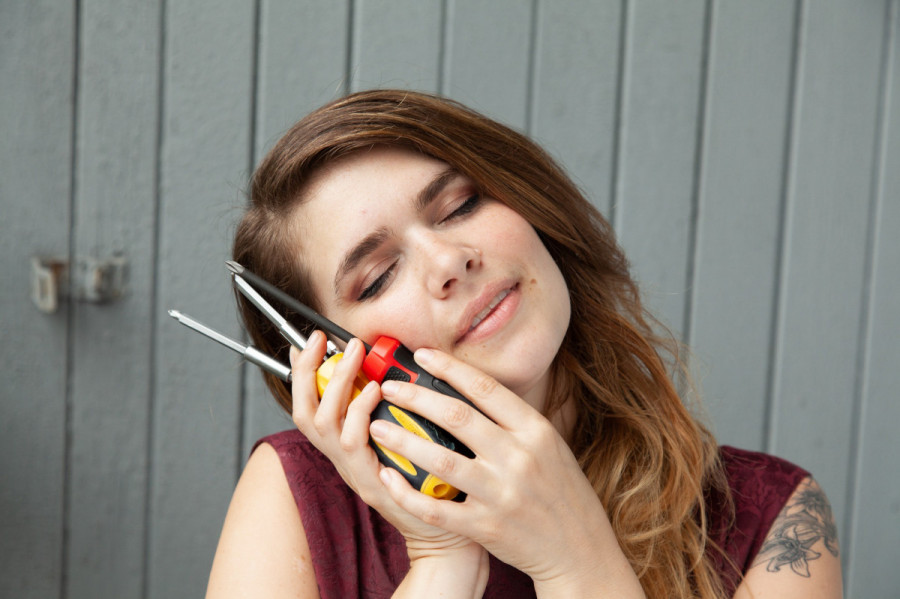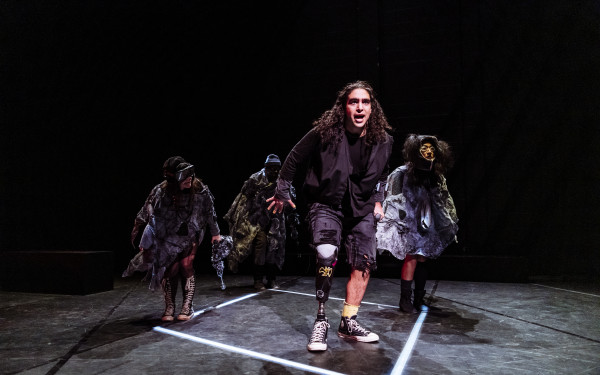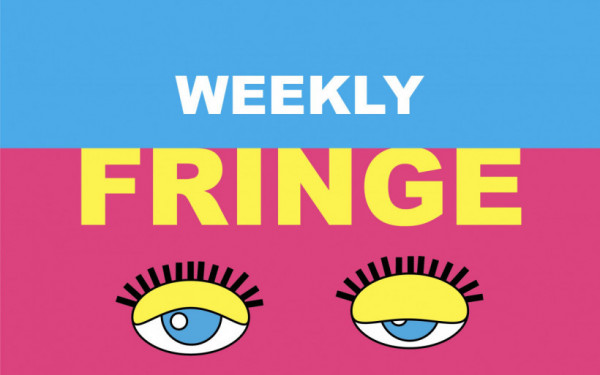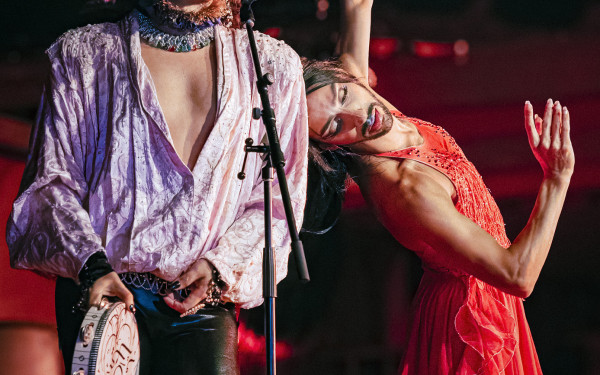Kate Hammer Anchors Their Name to Comedy
Hindwing Founder on Life and Their Debut Memoir
“It’s interesting when you choose your own name instead of being given one,” Kate Hammer said, their pearly whites glowing brightly in the dim lighting of Café Aunja, a basement café on Sherbrooke St.
Hammer’s legal name is Kate Lindner, but they decided to perform with their maternal surname under the exposure of Montreal’s spotlight.
“It helped me take ownership of my comedy,” they said.
Hammer’s plan to change their name did not signal signing away their soul to the industry. Rather, they had grown tired of correcting the hosts, who struggled to pronounce their last name whenever stepping to the mic.
Hammer is in the process of writing a debut non-fiction memoir, two plays for script incubator Infinitheatre, and one play for the Queer Reading Series at the Centaur Theatre.
They also founded The Hindwing Press, Concordia’s first comedy journal, and INFEMOUS, a performance space that caters to femme and non-binary comedians.
“For me, it meant taking ownership of what I’m presenting to the world instead of having them take ownership of me,” they said.
They won the Colin Krivy Award last year for Excellence in Playwriting at the McGill Drama Festival. Their play Mike & Jo (Jo & Mike) was the victor over other student-written plays presented at the Mainline Theatre.
Hammer’s name change was unofficial, and it was as simple as posting it on their Facebook profile. “It’s even tricked my mom now,” they said.
The comedian and dramatist knew they wanted to perform from a young age. Having grown up in rural Canada, they remembered daydreaming as a child and picturing their sudden rise to stardom, already self-mythologizing a famous life for themself.
“I always had this dream of being found,” they said.
As a child, they used to perch on the front steps of their goat farm passively waiting for opportunities to arise, longing to be discovered to play a lead role in a movie and to connect with what was beyond the enclosure.
They desired the validation and attention, but most of all, it was about the connection.
Even in the home, Hammer’s artistic aspirations made them feel like an outsider, almost convincing them that they were adopted. “I felt very different from my family,” they said.
Their older brothers would tease them growing up, saying that Hammer was bound to live in the city, which was “a sick burn” at the time according to Hammer.
The kid who danced and gripped a microphone in the home videos wanted to re-ignite the family traditions. Humour and entertainment came naturally to Hammer, allowing them to explore and redefine the craft on their own terms while helping them mold their identity.
“As a kid, I was always trying to entertain people,” they said. “The person who held the funny in the family held power.”
They took part in musicals and went to acting camp during high school, but when the time came to decide what they wanted to pursue in university, they chose a different route and left for Europe.
“I did one last joyride around Europe working before I started university,” they said, recalling the events that unfolded working as an au pair and tour guide for almost five months.
It was time to reflect for Hammer, who wanted to be sure of their field of study. They contemplated acting, theatre, film, and even engineering.

“The person who held the funny in the family held power.” —_Kate Hammer_

Ultimately, the option that encompassed all the skills they wanted to work on was creative writing.
“I broke up with my long-term partner, quit my job, applied to school, and got my TEFL [Teaching English as a Foreign Language] certification for really no reason other than stress,” they said.
Hammer’s memoir will dive deep into their transfiguration, from their self-discovery in Europe to their acceptance into Concordia’s creative writing program.
“It’s one of those coming-of-adult-age stories,” they explained.
Hammer, who idolized actors like Mindy Kaling and Tina Fey, among others, created their own success by writing and constructing their roles. They thought that writing was a useful skill for aspiring performers unable to attend private art institutes.
“The scariest thing about the arts is that you don’t have control over your success or your own path,” they explained.
To Hammer, the acting world can be like gambling. It’s exciting, but more often than not it can leave the aspiring actor empty-handed.
“You could always have the next big role tomorrow, but that role could also not exist ever,” they said.
With creative writing, Hammer aims to control their success by building roles and writing narratives that they can both publish and perform. “Unless you have some semblance of autonomy or agency in this world, […] then it could feel really hopeless,” they said. “You’re just dangling on someone else’s strings.”
As one of the first universities in Canada to offer an undergraduate degree in creative writing, Concordia allowed Hammer to start their studies right away.
“What comes with university is the networking, the people, the sketch groups, [and] the filmmakers,” said Hammer about manoeuvring the university’s labyrinthine social life.
In Montreal, Hammer took a level-one improv class for the first time. While attending their classes at Concordia, they had time to work on their comedic voice both as a writer and performer.
Sarah Swinwood, a Concordia student, comedian, and writer, recalled her early encounters with Hammer. The two ran into each other on the bus, and also coincidentally sat in the same Indigenous spirituality class. They were both enrolled in the creative writing major, but they found one another instead in the theology class.
“Both [encounters] had nothing to do with comedy,” Swinwood said. “It had more to do with self-care and health and well-being and spirituality.”
“They were very receptive to what I had to share [in the class],” she uttered about the serendipitous meeting of their minds. Swinwood is a writer working on two essays, one tragic and one comic.
Both non-fiction stories explore how they help to process tragedy in daily life.
“Comedy helps relieve, but then the expression of the tragedy that happened is also touching and heart-opening,” she explained.
Swinwood believes it’s important to process our emotions and that creative expression can help us feel it without crumbling. “Think of crying as a frozen river warming up and flowing,” she said.
Hammer will step down as editor-in-chief of The Hindwing Press when this winter semester ends. “I love when something I start is owned by someone else,” they added. “I think that [it] is the coolest thing.”
When Swinwood first published a comedic poem for The Hindwing Press, she felt overjoyed, but she noticed that joy could sometimes verge on obsession.
“I decided to lean into it. I decided to write about juggalos,” Swinwood said, referring to die-hard fans of the hip-hop group Insane Clown Posse.
Swinwood also believes Hammer has a “very powerful energy field.” After they connected on the bus ride, Hammer invited Swinwood to perform for INFEMOUS, a sketch and improv hour featuring women and non-binary comedians.
Last spring, Hammer became an editor for a yet-to-be launched app. They manage a team of three people to prepare 10-minute clips—accessible educational and storytelling episodes that touch on finance, relationships, anxiety, or health.
While Hammer gets more experience with the editing process, they sighed at the thought of editing their own written work. “If you write like I do, in a stream-of-conscious flow where everything is connected, it’s really hard to edit,” they said.
Working for the start-up allows them to practice structure and form. According to Hammer, academic courses did not focus so much on those aspects of writing. “I’m getting really good at editing and structure and seeing it from different views,” said Hammer.
They admitted that they were better at receiving peals of laughter than the kind comments or remarks given by professors, critics, or audience members. The spectators’ reactions and emotions became a craving of theirs over time.
“I think we’re all bad at taking compliments,” they said.
When Hammer recalled the time they had to decide on what they wanted to study in university, they said many nudged them to pursue studies in acting. They remembered being hesitant because the choice felt more limiting than creative writing. “You can also learn how to act through workshops, through life,” they said. Wherever new thoughts may surface or intertwine, Hammer’s wit and charm as a performer translate into their everyday speech and expression, making them a fearless conversationalist.
“I think that’s why I continue to stick my little fingers into each of these pots,” Hammer said, referring to their penchants for playwriting, performance, and comedy, “because you never know what’s going to lead to the path you want.”






_2_600_375_90_s_c1.jpg)
